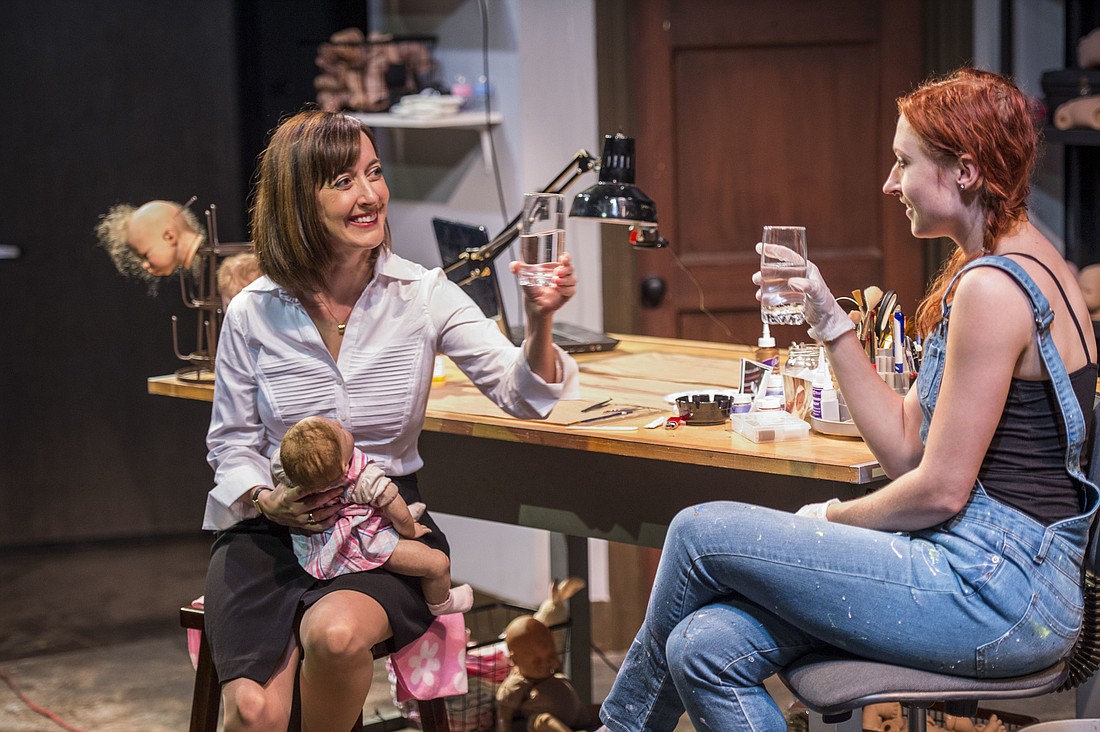- December 13, 2025
-
-
Loading

Loading

Zayd Dohrn’s “Reborning,” is experiencing its regional nativity at the Urbanite Theatre. To be clear, the play’s title doesn’t refer to the born-again experience or reincarnation. “Reborning” is a fad (or cult depending on who you ask) involving extremely realistic baby dolls. The market for these dolls isn’t child’s play. Aside from a few collectors, most of the customers are grieving parents who want exact replicas of their lost infants. The artists who create these dolls get thousands of dollars for their work.
That’s what Kelly (Megan Rippey) does for a living. Her apartment is also her workshop. (Rick Cannon’s stunning set resembles Rob Zombies’ nursery room decorated by H. R. Giger — a worktable and bins of infant heads, arms and legs in various stages of assembly.) Kelly lives here with Daizy (Brendan Ragan), her happy-go-lucky artist/boyfriend who uses the same skill set to create “adult” toys. (Another lucrative market.) And, yes, the play dials the creepiness up to 11. And that’s really the point.
Dohrn’s play revolves around two creepy questions: What does it mean when people bond with an inanimate object that only seems to be human? What does it mean when people treat other people like things?
Kelly knows what that means. We discover that, when she was an infant, her mother tossed her in a dumpster after stabbing her with a screwdriver and burning off her fingerprints with acid. Kelly is damaged goods — and most of her deepest scars are on the inside. Creating these perfect doll babies is a kind of therapy for her: substitute motherhood and babyhood at the same time. Thanks to her dolls and Daizy’s saintly support, she keeps it together, but barely. Addiction and self-harm is the shotgun on the mantle here.
Kelly’s always ready to go off. She holds it together, until a demanding customer upsets the equilibrium. Emily (Natalie Symons) a high-power attorney) wants a surrogate for her lost baby, Eva. She loves Kelly’s work, but the replica’s never quite exact enough. (Something about the eyes, the skin tone. Close, but no cigar.) Emily’s perfectionism pushes Kelly’s OCD buttons and sends her on a manic spiral. (I’ll let you see for yourself where that spiral ends.)
Brendon Fox’s matter of fact direction suits the play’s gritty, documentary tone. He makes it clear we’re not looking at a fable or an allegory. These are real people in a real situation. (More on that later.)
The actors embodying Dohrn’s well-drawn characters are at the top of their game. Rippey is improbably vivacious as a character who’s shut down her sexuality, humanity and possibilities for human connection. Kelly’s walled off her soul behind electric fences, minefields and “no trespassing” signs. But her soul fights to be free — and her character whipsaws between full-on psychodrama and emotional shutdown. The truth lies somewhere between the words she screams and the words she doesn’t say. Rippey makes you believe in her self-imprisoned soul. Ragan gets the thankless task of being Mr. Niceguy and Mr. Sane. He goes the extra mile for the woman he loves — but does it in a goofy, happy, hound dog way with no hint of put-upon, self-sacrifice. (Is anybody really that nice? A moot question. Structurally, the play needs one character who’s playing with a full deck.) Symons’ Emily seems sane at first — but the mask of her high-functioning lawyer persona is starting to crack. Her desperation leaks out by inches, which makes it all that harder to take.
That’s not to say the play is hard to take. There are actual laughs — lots of them. To be sure, Dohrn takes this material to its logical extremes — with verbal karate out of the “Who’s Afraid of Virginia Wolfe?” and a take on male-female relationships to make Neil LaBute wince. But most of the time, his play feels like an oddly realistic black comedy. Here, the closest stylistic comparison is Sam Shepard. As weird as it gets, Dohrn’s play stays grounded in reality. So, Daizy makes the tension-defusing wisecracks a real person would make under the circumstances. Kelly’s doll-making gear is well-researched and believable. This may be a mad world, but it’s our world, not a bad dream.
Dohrn takes us to the uncanny valley at the edge of humanity. Building a hyper-realistic doll takes immense artistic training, skill and a high level of technology. It only takes one random act of cruelty to rob a person of their sense of self. Human beings are much more fragile than dolls.
And not so easily repaired.